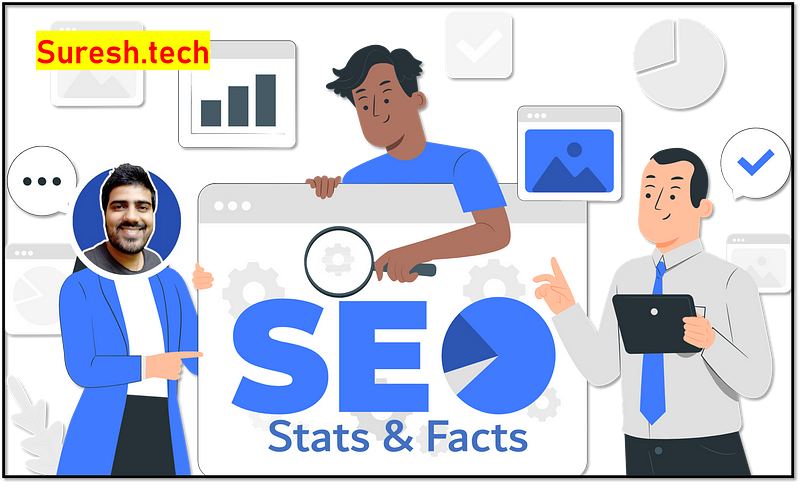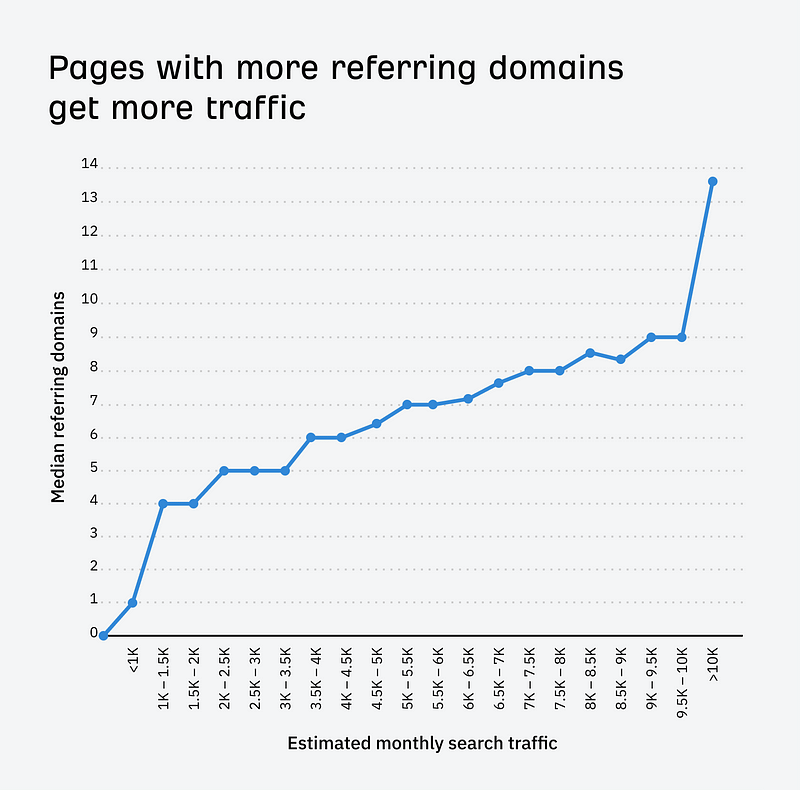Do you want to increase your organic search traffic in 2025?
Are you curious about what the SEO optimization landscape looks like? Then check out this guide.
Google holds about 89.73% of the search internet share, so it’s a major key to improving your ranking on search engines such as Google, Bing, Yandex, DuckDuckGo, and Yahoo.
Find all the latest SEO optimization statistics and trends to help your marketing strategy.
Search engine optimization is constantly evolving.
And knowing all the latest SEO statistics is very important for your online business.
With these SEO stats and facts, you can grow organic search traffic and stay ahead in the ever-evolving SEO space.

In this post, I’ve compiled a list of the most up-to-date SEO statistics businesses should know.
These SEO stats will help you improve the effectiveness of your SEO strategy and overall business with data-backed insights.
Without further ado, here are some of the interesting SEO stats you must know:
Top 14 SEO Statistics of 2025: You Must Know
According to Suresh.tech, these are the top 14 SEO optimization statistics that one should know before starting SEO campaigns.
- Organic search traffic is responsible for 53% of total website traffic.
- 93% of online experiences start with a search engine, mainly Google.
- Google has 89.74% of the global search engine market share. (Bing has 3.97%)
- Google has 93.88% of the global mobile search engine market share. (Bing has 0.84% with a surprise entry of Yandex 2.38%)
- 93% of global traffic comes from Google which includes platforms like Google Search, Google Images, and Google Maps.
- SEO drives 1,000%+ more traffic than other organic channels.
- In 2025, businesses consider SEO as one of the most effective marketing channels, with 16% weightage.
- Content marketing is another effective marketing channel with 14% weightage.
- Google follows over 200 ranking factors.
- Once you rank your pages on the first page, the average page age is 2+ years.
- 75% of users do not go beyond the first page.
- 60% of marketers say that leads generated through SEO have the maximum close rate.
- 53% of SEO marketers build and optimize SEO strategies using AI technology.
- The most popular AI SEO content tools are Scalenut, Frase, and Brandwell AI.
Let’s get into the details.
15 Search Engine Specific Statistics
If you are in the field of SEO, knowing the search engine stats is very crucial.
These search engine statistics will help you understand the state of search engines and where they’re heading in the future.
- Google is the world’s favourite search engine and is used by a maximum number of people. 93% of online experiences start with Google.
- Google has 94.88% of the global mobile search engine market share whereas Bing has 1.34%.
- Google’s search index is more than 100 million gigabytes in size and contains hundreds of billions of web pages.
- Google processes over 8.5 billion searches each day.
- 75% of users do not go beyond the first page of the search engine.
- Google owns 86.58% of the Search Engine Market Share in the US.
- 77% of users search with Google 3 or more times per day.
- The majority of Google’s search traffic comes from mobile devices.
- 61.5% of desktop searches and 34.4% of mobile searches result in zero clicks.
- Around 15% of all Google searches are completely new and have never been searched before.
- The average top-ranking result has a CTR of 9.28%, followed by 5.82 and 3.11% for positions two and three.
- 39% of online purchasers are helped by a relevant search.
- Facebook and YouTube are the two most searched keywords globally.
- Baidu owns 85.48% of the search marketing in China whereas Google has 2.93% market share.
- Around 19% of users can’t distinguish between Ads or Organic search results on search engines.
SEO Optimization Statistics
Check out the SEO optimization stats that help you rank on Google and other search engines.
- Google relies on multiple ranking factors. There are over 200 factors.
- The top traffic source for all websites is organic search.
- 95% of all pages have 0 backlinks.
- The first results have an average of 3.8 times more backlinks than the results that rank between second to tenth position.
- The average word count of pages on the first page of Google results is between 1000 to 1500 words.
- Articles with 1400+ words tend to generate more backlinks.
- Only 5.7% of pages rank on the first page within a year of publication.
- The average page in the top 10 is between 5 days to 2 years old.
- 96.55% of all the web pages get 0 search traffic from Google.
- Only 0.07% of all pages get 1000+ monthly search visits from Google.
- About 1.08% of all the pages get 11 to 100 monthly visits from Google searches.
- The average time on the website for a Google first page result is 2.5 minutes.
- The top-ranking page gets the most search traffic only 49% of the time.
- The average length of URLs on the first page of Google results is about 66 characters.
- URLs that contain a target keyword have a higher chance of ranking at the top.
- Pages with URLs that contain a keyword have a 45% higher CTR.
- The length of a title tag is between 50 and 60 characters, or around 580 pixels on a desktop.
- 7.4% of top-ranking pages don’t have a title tag.
- Google rewrites title tags 33.4% of the time.
- The length of a meta description tag is between 150–160 characters or around 920 pixels on a desktop.
- Google rewrites meta description tags 62.78% of the time.
- Even if your meta descriptions are within the recommended limits, it does not guarantee that they are less likely to be rewritten by Google.
- When Google ignores the title tag, it uses the H1 tag from the web page 50.76% of the time.
- Google is 57% more likely to rewrite title tags that are too long.
- 25.02% of top-ranking pages don’t have a meta description.
- 40.61% of pages have meta descriptions that truncate.
- Google shows meta descriptions in search results only 37.22% of the time.
- 31.9% of shoppers discover brands with search engines like Google and Bing.
- The average top-ranking page also ranks in the top 10 search results for nearly 1,000 other relevant keywords.
- 22% of pages that rank on the first page are ones created within the same year.
- High-DR websites get better rankings than low-DR websites.
- 89.1% of link builders say nofollow links impact search engine rankings.
- It takes an average of 3.1 months to see the impact of a link on search ranking.
- Around 50–65% of all number-one spots are dominated by featured snippets.
- An increase in page load time can affect your bounce rate score.
Do you want to improve SEO? You can follow my guide on beginner-friendly SEO tips.
SEO Backlink-Specific Statistics
SEO experts say that backlinks are one of the most important ranking factors. Read these SEO backlink-related stats.

- Pages with more unique referring domains get more search traffic.
- 100 top-ranking domains had at least one backlink.
- Around 67.5% of SEOs consider backlinks to impact SEO rankings.
- There’s a positive correlation between the number of websites linking to a page and its search traffic.
- There’s a positive correlation between the number of websites linking to a page and its ranking position.
- Most top-ranking pages get “followed” backlinks from new websites at a pace of +5%-14.5% per month.
- 73.6% of domains have reciprocal links, meaning that some of the sites they link to also backlink to them.
- 43.7% of the top-ranking pages have some reciprocal links.
- 66.5% of links to sites in the last nine years are dead.
- 10.6% of all backlinks to the top 110,000 sites are nofollow.
- 0.44% of links use “rel=ugc” and 0.01% use rel=“sponsored”.
- 74.3% of SEO link builders pay money to acquire links.
- The average cost of a paid link is between $50 to $100.
- In-house SEO experts pay 75% more for backlinks than niche site owners.
- Paying for links yields only an extra 2 backlinks per month.
- Link builders using social media build 22% more backlinks than those who don’t.
- URLs with more anchor text variations from internal links are highly correlated with more Google search traffic.
- Pages with at least one exact match anchor had at least five times more traffic than pages without.
- SEOs typically take 1–2 hours to build a single backlink from other domains.
- 94% of all web pages in existence have zero external links.
- Companies spend between $5,000 to $10,000 a month to acquire links.
Keyword-Related Statistics
SEO starts with keywords or you can say queries. Here are 10 important keyword-related stats you must know.
- Zero-volume keywords can drive traffic.
- 15% of keywords are completely new and have never been searched on Google.
- Over 50% of all searches contain 4 or more keywords.
- More than 29% of keywords with 10,000 searches per month consist of 3 or more keywords.
- Around 8% of all search queries are question-based. Eg. What is, How to, Who is, Is keyword, Does keyword etc.
- 94.74% of keywords get 10 monthly searches or fewer.
- 0.0008% of keywords get more than 100,000 monthly searches.
- 91.45% of search volumes in Google Ads Keyword Planner are overestimates.
- Google Ads Keyword Planner overestimates search volumes 54.28% of the time and is roughly accurate 45.22% of the time.
- 46.08% of clicks in Google Search Console go to hidden terms.
SEO Stat Sources: Gs.statcounter, Ahrefs, BrightEdge, SparkToro, Statista, Backlinko, Google, Think With Google, Hubspot, Exploding Topics, LinkedIn.

Leave a Reply